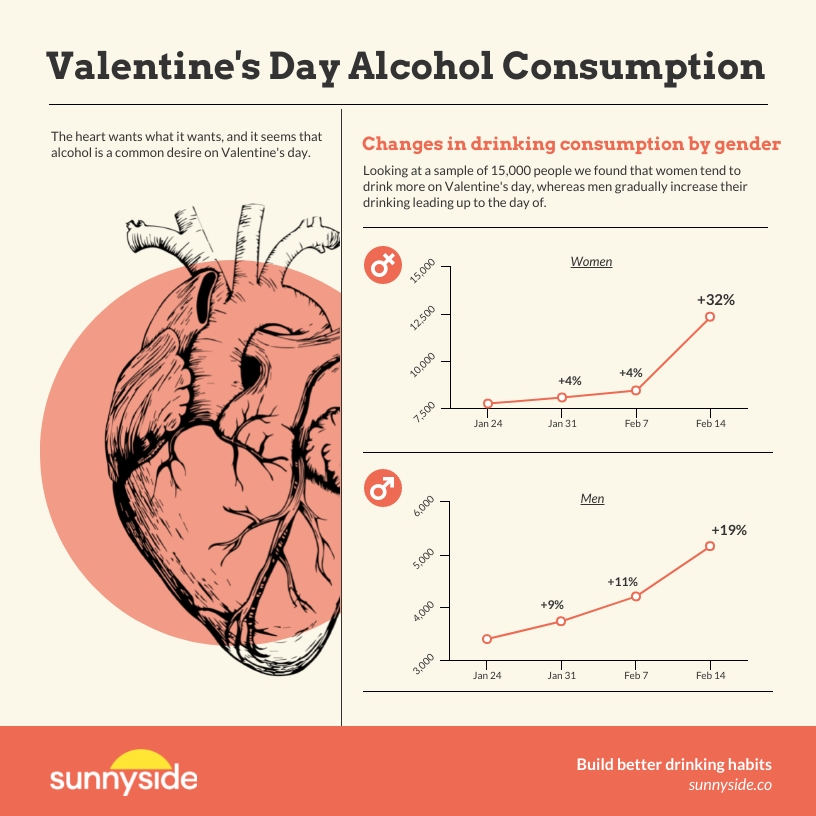Last Updated on February 13, 2024
Does a glass of red wine a day really make you healthier? What about white wine, beer, or a cocktail? What if it’s 6 or 7 glasses over the weekend instead of one a day – does that matter?
With so many studies on “moderate drinking” and heart health, it’s hard to know exactly how much, how often, and what type is best for you.
In this article, we’re going to find out what exactly moderate drinking means and how it can benefit your heart health, just in time for Valentine’s day.
What is Moderate Alcohol Consumption?
Moderate drinking is defined as one drink a day or less for women and two or less for men. One drink, however, isn’t always the same for everyone, with many people overfilling their glasses.
Technically, one alcoholic drink is about 12 ounces of beer, 4 ounces of wine, or 1.5 ounces of 80-proof spirits.
Keep in mind, if you have certain health issues your doctor may likely recommend that you avoid alcohol entirely. This includes certain heart rhythm abnormalities and medications, past heart failure, hypertension, pregnancy, recovery from alcoholism, other chronic conditions, etc.
Binge Drinking and Heavy Drinking
Saving up your drinks for the weekend is considered binge or heavy drinking and doesn’t count as moderate drinking. Binge drinking is when a man has 5 or more drinks in two hours, or a woman has 4 or more. Heavy drinking is 4 or more in a day for men, or 14 a week, and 3 on any day, or more than 7, for women.
Alcohol’s Effect on the Heart
When you drink, your heart rate and pulse can either decrease or increase. This is a temporary change and normal after even a drink or two. Fortunately, it’s not something to worry about if you’re healthy. With heavy alcohol use, however, your heart rate and blood pressure may permanently elevate, weakening the heart muscle. In rarer situations more chronic conditions like tachycardia may also develop, which is an increased heart rate because of electrical signal issues in the heart.
Alcoholic cardiomyopathy is another issue, where long-term heavy alcohol use weakens, thins, and stretches out the heart muscle. The heart can’t pump blood efficiently, disrupting blood flow to the entire body’s major organs. The lack of oxygen can do more than make you tired, leading to liver hardening, difficulty breathing, and possibly even heart failure.
Overall, alcohol and heart disease are intricately tied together, with moderate drinking having a potentially positive effect, and heavy use an endless list of risks. If you enjoy drinking regularly, it’s a fine line to dance between, making it all the more important to measure your alcohol.
Start tracking your drinkingThe Benefits of Moderate Alcohol Consumption on Heart Health
Now that the details are done, here are the benefits you could get if you drink moderately:
Reduced Risk of Heart Disease
Over the last few decades, hundreds of studies have shown that light to moderate drinking may be beneficial for heart health. The research states that these drinkers often have fewer cardiovascular events and heart disease.
There’s also evidence supporting the claim that the ethanol in alcohol is causally related to a lower risk of coronary heart disease through its effect on lipid and hemostatic factors. However, the exact mechanisms aren’t fully understood.
Alcohol’s benefits and drawbacks change depending on your genetics, too. That means that moderate drinking may be healthy for the majority of people, but it isn’t necessarily healthy for everyone, and this is especially the case if you have a health condition.
Lower Blood Pressure
If you’re a heavy drinker, your blood pressure can significantly decrease by becoming a light or moderate drinker. Of course, those who already have high blood pressure should either abstain or drink lightly, depending on the severity of the condition, since moderate usage might still have a negative effect.
Increased “Good” Cholesterol (HDL) Levels
Moderate drinking is associated with an increase in HDL cholesterol, which may be the primary reason why the risk of coronary heart disease decreases with moderate drinking. However, the type of alcohol drunk may matter and the exact causes aren’t exactly known. Future studies are needed to also confirm confounding factors, such as genetics, lifestyle factors, and differences between liquor, beer, and wine.
For the moment, red wine seems to be the best thanks to its high level of antioxidants, but others can still be beneficial.
Reduced Risk of Stroke
Countless studies have researched the relationship between the risk of stroke and alcohol consumption and showed that moderate drinking can decrease the risk of stroke. While the exact cause isn’t known, it’s at least certain that decreasing from a heavy to moderate level can help to reduce the risk.
Other Potential Health Benefits
Besides improved heart health, there are other benefits to drinking moderately, including:
Reduced Risk of Type 2 Diabetes
Surprisingly, light to moderate drinking seems to help lower your risk of developing type 2 diabetes. However, drinking patterns matter; those who binge drink or drink heavily increase their risks. Good results seem to come from moderate amounts over 3 to 4 days per week. Wine seems to be particularly beneficial, but more studies need to be done on beer and spirits.
For those already with diabetes who may be worried about the amount of alcohol they can drink, research shows that light to moderate drinking could beneficially increase insulin sensitivity. It may also contribute to healthier triglycerides and HDL or “good” cholesterol levels, decreasing their risk of heart disease.
Improved Cognitive Function
Alcohol also affects just how well your brain works. Turns out, low to moderate drinking may help your overall cognitive function and lower the rate at which your cognition declines. That means your memory and problem-solving abilities could improve and last longer than heavy or even abstinent drinkers.
Longer Life Expectancy
An impressive article published last year in Nature followed over 430,000 adults and showed that modest drinkers who had no more than one drink a day had the most benefits. They could expect to gain almost an entire year in life expectancy, compared to a loss of 7 years for those who drank more.
New Research on Confounding Factors
It’s important to note that while there are many benefits associated with light to moderate drinking and red wine in particular, there are confounding effects that aren’t always accounted for in many studies.
For example, it’s possible that red wine drinkers have higher incomes, which is often associated with more access to healthy food and higher education. Because of this, they may also be more likely to partake in other healthy lifestyle activities, like exercise. You could also consider that they may have less financial strain, which can lead to less overall stress and inflammation. Unfortunately, these variables just aren’t accounted for in the majority of studies.
Now, however, there are new studies being done to account for these variables. A large study with almost 400,000 adult participants was released in 2022 on cardiovascular risk highlighting these confounding variables. Interestingly, results showed that while light to moderate drinkers had a lower risk of heart disease compared to non-drinkers, light to moderate drinkers also had healthier lifestyles.
Genetic evidence also showed that any level of alcohol intake could increase the risk of cardiovascular disease. This risk rises with higher intake, even at the levels officials currently claim to be low risk. So the health benefits to those who drink moderately are likely to be even higher than to those who drink less.
Take the 3-min quizModeration and a Healthy Lifestyle are Key
Light and moderate drinking can be relatively safe, but it’s also not necessarily an invitation to drink because of its supposed benefits. Other lifestyle factors must be taken into consideration, too. That means it’s a great reason to look at improving other areas of your life, too, like adding more nutritious foods to your meals and finding fun ways to move your body.
For heavy drinkers, reducing to moderate drinking is going to have a huge overall benefit. Luckily, starting with even a small reduction can make a difference. So if you’re not quite sure you want to give up or cut back to light amounts, taking a small step towards moderate levels can still be good for you. That’s where apps like Sunnyside come in, helping to shed light on your habits with pressure-free tracking and personalized goals.
Other Risks of Excessive Alcohol Consumption
Of course, drinking heavily comes with many side effects, including the possibility of at least 25 different chronic diseases. These include certain cancers, tumors, liver cirrhosis, pancreatitis, neuropsychiatric conditions, and digestive and cardiovascular diseases.
There’s also the psychological side, where depression and anxiety can develop. This can extend to family members or worried loved ones, too. Personal and work life can hang by a thread, and the trauma may be passed down to children, as well.
While it’s not easy or even always obvious that your drinking habits might be affecting you negatively, taking the time to track your behavior can help. It lets you see your patterns in black and white, which can help you choose habits for a better life.
Drink less and help your heartHeart-Healthy Ways to Celebrate Valentine’s Day
With Valentine’s Day just around the corner, it’s not uncommon to over-indulge with wine. In fact Sunnyside member’s reported drinking an average of 26% more alcohol on Valentine’s day compared to the weeks prior.
Women specifically drank 35% more on Valentine’s day, whereas men saw a gradual week over week increase in consumption (perhaps due to the stress of not having anything planned…?).

But Valentine’s day doesn’t have to involve overpriced dinners and expensive gifts. In fact, some of the most memorable moments can be created through simple and heart-positive activities.
Here are some ways that you can stay mindful on Valentine’s day, and keep your heart full and strong:
Get active together:
Take a romantic walk in a park or go for a hike. Exercise is not only good for the heart but also a great way to bond with your partner.
Cook a healthy meal:
Prepare a delicious and healthy meal together. Try cooking up some fresh fish or grilled vegetables, which are full of heart-healthy nutrients.
Have a spa day:
Treat yourselves to a relaxing spa day at home. Draw a bath, light some candles, and enjoy a massage or facial together. Keeping your stress levels down is another way to help keep your heart in check.
Have a movie night:
Snuggle up on the couch and watch a romantic movie or a comedy. Pop some popcorn or make some hot cocoa to enjoy together.
Play games:
Challenge each other to a game of chess, checkers, or a board game. You can also play video games together for a fun and competitive night in.
But of course, if you do choose to partake in the casual glass of wine, keep track of what you’re sipping and take note of how you feel in the moment.
Final Thoughts
With the hundreds of studies done on light to moderate drinking and health, it’s relatively safe to say that if you’re a healthy adult, sticking to the recommended amounts likely won’t have a serious negative effect on your heart health. In some areas, it may even help to increase your heart health, such as raising your good cholesterol levels and reducing your risk of stroke and type 2 diabetes. Of course, it depends on many factors and any other health conditions or medications.
Even with the impressive results done on alcohol and heart health, much more research needs to be done since the understanding behind these results still isn’t fully known. It’s possible it’s simply because those who drink lightly or moderately also live a healthier lifestyle, as new studies point out.
It’s also important to keep in mind what your relationship with alcohol is and how easy it is for you to maintain a low to moderate drinking level. It’s not always easy to track how much you’re drinking and whether or not you’ve accidentally slipped into the “heavy drinker” slot.
That’s why Sunnyside built an app that you can personalize to follow your daily habits and goals. There’s no pressure to even change your drinking habits, you can use it just to become more aware. Just tracking your habits and seeing them laid out before you can help shift you towards a healthier lifestyle. Feel free to take the quiz and give it a try for free to see if it works for you, just like it’s helped thousands of other mindful drinkers.
Disclaimer
This information is not meant to be considered medical advice.
If you’ve noticed or have been told that your drinking is interfering with your relationships, work, social activities, or how you think or feel, it’s possible you could have a drinking problem. The National Drug and Alcohol Treatment Referral Routing Service, available at 1-800-662-HELP offers 24/7 support for anyone struggling. Don’t be afraid to reach out – talking to someone can make all the difference.




